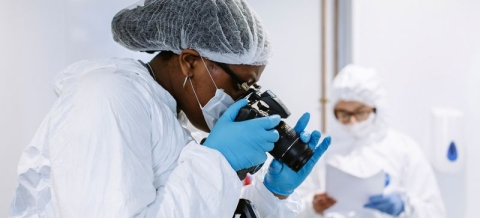
Forensic science has made a huge contribution to contemporary justice. Developments such as fingerprinting, forensic investigation and DNA recovery have changed the way crime is detected, prevented and investigated.
Forensic Science has been widely criticised, however, for lacking a robust evidence base. The House of Lords Science and Technology Select Committee Inquiry into Forensic Science (2019) highlighted the need for robust scientific data to support all aspects of forensic investigation from crime scene to court.
It is important that academic research addresses these recommendations and delivers impact in terms of outcomes that are translatable within practice. This group therefore aims to extend the evidence base behind forensic science practice by:
- Increasing the evidence base behind existing techniques and processes
- Developing novel techniques, technologies and processes to extend forensic capabilities
- Increasing understanding of the human factors present throughout the forensic process
This is achieved through common-themed, interdisciplinary projects and by working in collaboration with local, national and international partners for enhanced and robustly justified work around current priorities and validation studies.
We take a context specific approach to our research, acknowledging the complexity of the forensic science process and the dynamic and evolving nature of crime.
Research impact
Research undertaken by the group is impactful in a number of ways — helping to develop a much-needed evidence base and extend knowledge across the three areas listed above, underpinning the development of innovation and training activities, and directly informing forensic practice through collaboration on a local and national scale. Examples include:
- Learning needs analysis scoping study for the UK Transforming Forensics Programme
Provided recommendations in relation to learning needs analysis for fingerprint examination through operationally based action research on behalf of the national Transforming Forensics Programme.
- The Design and Delivery of a Research Informed Fingerprint laboratory Officer Training Programme
Research informed design for initial fingermark laboratory officer training, delivered to policing clients.
- National collaborative validation work (e.g. fingerprint powders)
The validation of currently used fingerprint powders as part of a national research consortium and in collaboration with the national Forensic Capability Network.
- Collaborative project working and mentorship arrangements through the Forensic Innovation Partnership
One example of this is the development of insect evidence collection protocols with forensic service providers and practising entomologists, for Hampshire Constabulary, to ensure best evidential value. Training of Crime Scene Investigators (CSIs) and Crime Scene Managers (CSMs) in insect awareness, value and sampling procedures facilitates robust investigative strategies.
- The development of the FIT-IN network
The establishment of a national network for sharing best practice and addressing challenges in industry-academia collaborative research.
- International, multidisciplinary collaboration (the UNDER group)
Collaborative working on buried human cadaver research at the ARISTA facility in the Netherlands, increasing the interdisciplinary evidence base for European decomposition. This work supports our ambition towards the development of further UK taphonomy facilities.
Current and recent projects
The group has a wide range of projects centred around three themes.
Theme 1: Increasing the evidence base behind existing techniques and processes
-
‘’Value of forensic science to criminal justice’’ Dr Paul Smith
Funded case study review of 150 sexual offence cases using the Home Office impact point approach to determine the value of forensic digital evidence has to rape and sexual offence investigations. Collaboration with Hampshire Police; Home Office; FCN; Staffordshire University; Staffordshire police; South Wales Police; University of South Wales.
-
‘’Set up to ‘Fail’? Implementing Contamination Minimisation Procedures and Environmental monitoring in a Sexual Assault Referral Centre’’, Dr Paul Smith
This research outlines a study reviewing the implementation of contamination reduction procedures at one UK SARC, providing a longitudinal examination of the outcomes of environmental monitoring procedures over a 12-month period. The outcomes show a myriad of factors affecting the process that need continual review and modification of the operating procedures to counteract these risks, as they arise. In collaboration with: Hampshire Police; Hampshire SARCs.
-
‘’Development of the first UK taphonomy facility: interdisciplinary cadaver decomposition research to provide a multidisciplinary approach to death scene reconstruction’’, Dr Kat Brown
‘’Exploration of the Death Environment: Evidencing The Need for a Centre of Forensic Excellence for Forensic Taphonomy’’ Dr Kat Brown
This longstanding entomological research has led to development of a wider taphonomic research centre at Southwick Park. Much of this work has been underpinned by this early research, whereby now we look to explore the cadaver decomposition process from multiple angles, including insects, taphonomy, chemistry and microbiology.
-
“Pigs vs AI: Can we use machine learning, as a substitute for human taphonomic facilities, to map and predict taphonomic change” Dr Kat Brown, Dr Helen McGonigal, Dr Ella Haig
This new project will explore the array of existing animal and human decomposition datasets for the creation of a new artificial neural network model (ANNs) for estimation of time since death. By conducting large scale porcine studies, this model will be tested, and its potential assessed for use in forensic investigation, with the aim of producing recommendations for new taphonomy research.
Theme 2: Developing and applying novel techniques, technologies and processes to extend forensic capabilities
-
The use of 3D printed bones as a method for body reconstruction in post-mortems, Dr Amber Collings and Dr Kat Brown
Looking to improve the techniques available to mortuary staff when post-mortem sampling is required or damaged remains are received.
-
‘’Enhancing injury imaging techniques for police investigators’’ Dr Paul Smith, Dr Helen McGonigal, Zoe Cadwell
The aim is to build a database of injury types using these techniques and evaluate its performance based on demographics. The techniques are induced fluorescence UV, cross-polarisation, white light photography and reflected UV / near UV light. In collaboration with: Metropolitan Police; FCN; Hampshire Police; National Crime Agency.
-
"Improving the Sustainability of Forensic Consumables" Dr Paul Smith, Dr Jodie Coulston, Dr Helen McGonigal
A case study approach to support the design and implementation of environmentally friendly consumables for forensic packaging. The aim is to develop sustainable consumables and new procedures and for forensic evidence recovery. In collaboration with: FCN; Hampshire Constabulary; Bedfordshire Police; Herts Police; Cambridgeshire Police.
Theme 3: Increasing understanding of the human factors present throughout the forensic process
-
‘’Understanding the expertise and decision making of crime scene examiners’’ Sarah Evans, Dr Helen Earwaker
Experimental work looking to explore the concept and variety of expertise within crime scene investigation and the impact of information on decision making in a crime scene environment.
-
‘’A cultural change to enable improved decision-making in the forensic sciences’’ Dr Helen Earwaker
A conceptual examination of decision making across the forensic sciences.
Facilities
- Forensic Innovation Partnership (FIP)
- Collaborative Taphonomic Research Facility
- Fingerprint enhancement facilities
- Ecology lab
- Crime scene simulation facilities
- VR and eye tracking equipment
- Hydra immersive learning and dynamic decision making suite
- 3D printing and scanning capabilities

Take a tour
We are aware that this H5P component is not fully accessible. If you would like a copy of this item, please email websupport@port.ac.uk. Please also refer to our Accessibility Statement
Partnerships and collaborations
- Bedfordshire Police
- Cambridgeshire Police
- Deakin University, Australia
- Dorset Police
- Defence Science and Technology Laboratory (DSTL)
- Forensic Capability Network (FCN)
- Hampshire Police
- Hampshire Sexual Assault Referral Centres (SARCs)
- Hertfordshire Police
- Home Office
- Metropolitan Police
- National Crime Agency
- South Wales Police
- Staffordshire Police
- American law enforcement
Researchers
Group leads:

Dr Katherine Brown
Group members:

Professor Paul Smith
PhD projects
-
Assessing the use of entomological evidence to aid offender identification through DNA analysis within sexually motivated death investigations.
-
To what extent do cognitive bias and other intrinsic and extrinsic factors have on the reliability and validity of the decision-making process made by crime scene investigators?
Sarah Evans
-
Evaluation of GSR background contamination in police establishments and the suitability of IR as a detection of unspent primers after firing.
Claire Rhodes
-
Optimising the development and visualisation of latent fingermarks on evidential items from clandestine burial environments.
-
The use of alternative light sources for the location and identification of bone in forensic environments.
Emma Morgan
-
Improving the Sustainability of Forensic Consumables
Becci Henderson
Explore our research
School of Criminology and Criminal Justice
Read more about the School of Criminology and Criminal Justice, and explore the teaching and research activities that take place within it.

Collaboration of Forensic Interviewing Group
The Collaboration examines the best ways to elicit reliable and fulsome information from interviewees in a trauma-informed way and to ensure informed decision-making.

Cybercrime and Cybersecurity Group
We're researching how crime takes place using technology, such as cyber fraud, hacking, online abuse, and its impact on individuals and society.

Economic Crime Research Group
We're researching the scale, impact and cost of economic crimes — such as fraud, corruption and money laundering.

Missing Persons Group
We're researching patterns of behaviour that may precede a person going missing and working to improve how cases are handled.

Policing Research Group
We're working in collaboration with local, national and international police organisations to research the social, economic and political context in which policing operates.

Probation, Prison and Penology Group
The University of Portsmouth is working to better understand the role of punishment & how this links with processes of justice and rehabilitation to promote change.

Victimology and Ecological Justice Group
We're researching victims and victimisation, inequality, domestic and online abuse, ecological justice, wildlife crime and climate change.

